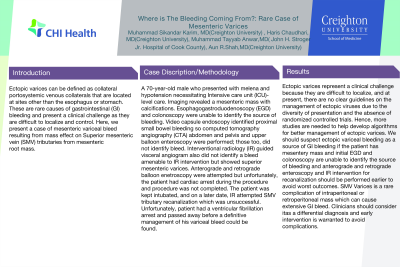Tuesday Poster Session
Category: GI Bleeding
P4234 - Where is The Bleeding Coming From?: Rare Case of Mesenteric Varices
Tuesday, October 29, 2024
10:30 AM - 4:00 PM ET
Location: Exhibit Hall E

- MK
Muhammad Sikandar Karim, MD
CHI Health Creighton University Medical Center
Omaha, NE
Presenting Author(s)
Muhammad Sikandar Karim, MD1, Haris Chaudhry, MD1, Muhammad Tayyab Anwar, MD2, Aun R. Shah, MBBS, MRCP1
1CHI Health Creighton University Medical Center, Omaha, NE; 2John H. Stroger, Jr. Hospital of Cook County, Chicago, IL
Introduction: Ectopic varices can be defined as collateral portosystemic venous collaterals that are located at sites other than the esophagus or stomach. These are rare causes of gastrointestinal (GI) bleeding and present a clinical challenge as they are difficult to localize and control. Here, we present a case of mesenteric variceal bleed resulting from mass effect on Superior mesenteric vein (SMV) tributaries from mesenteric root mass.
Case Description/Methods: A 70-year-old male who presented with melena and hypotension necessitating Intensive care unit (ICU)-level care. Imaging revealed a mesenteric mass with calcifications. Esophagogastroduodenoscopy (EGD) and colonoscopy were unable to identify the source of bleeding. Video capsule endoscopy identified proximal small bowel bleeding so computed tomography angiography (CTA) abdomen and pelvis and upper balloon enteroscopy were performed; those too, did not identify bleed. Interventional radiology (IR) guided visceral angiogram also did not identify a bleed amenable to IR intervention but showed superior mesenteric varices. Anterograde and retrograde balloon enetroscopy were attempted but unfortunately, the patient had cardiac arrest during the procedure and procedure was not completed. The patient was kept intubated, and on a later date, IR attempted SMV tributary recanalization which was unsuccessful. Unfortunately, patient had a ventricular fibrillation arrest and passed away before a definitive management of his variceal bleed could be found.
Discussion: Ectopic varices represent a clinical challenge because they are difficult to localize, and at present, there are no clear guidelines on the management of ectopic viruses due to the diversity of presentation and the absence of randomized controlled trials. Hence, more studies are needed to help develop algorithms for better management of ectopic varices. We should suspect ectopic variceal bleeding as a source of GI bleeding if the patient has mesentery mass and initial EGD and colonoscopy are unable to identify the source of bleeding and anterograde and retrograde enteroscopy and IR intervention for recanalization should be performed earlier to avoid worst outcomes. SMV Varices is a rare complication of intraperitoneal or retroperitoneal mass which can cause extensive GI bleed. Clinicians should consider it as a differential diagnosis and early intervention is warranted to avoid complications.
Disclosures:
Muhammad Sikandar Karim, MD1, Haris Chaudhry, MD1, Muhammad Tayyab Anwar, MD2, Aun R. Shah, MBBS, MRCP1. P4234 - Where is The Bleeding Coming From?: Rare Case of Mesenteric Varices, ACG 2024 Annual Scientific Meeting Abstracts. Philadelphia, PA: American College of Gastroenterology.
1CHI Health Creighton University Medical Center, Omaha, NE; 2John H. Stroger, Jr. Hospital of Cook County, Chicago, IL
Introduction: Ectopic varices can be defined as collateral portosystemic venous collaterals that are located at sites other than the esophagus or stomach. These are rare causes of gastrointestinal (GI) bleeding and present a clinical challenge as they are difficult to localize and control. Here, we present a case of mesenteric variceal bleed resulting from mass effect on Superior mesenteric vein (SMV) tributaries from mesenteric root mass.
Case Description/Methods: A 70-year-old male who presented with melena and hypotension necessitating Intensive care unit (ICU)-level care. Imaging revealed a mesenteric mass with calcifications. Esophagogastroduodenoscopy (EGD) and colonoscopy were unable to identify the source of bleeding. Video capsule endoscopy identified proximal small bowel bleeding so computed tomography angiography (CTA) abdomen and pelvis and upper balloon enteroscopy were performed; those too, did not identify bleed. Interventional radiology (IR) guided visceral angiogram also did not identify a bleed amenable to IR intervention but showed superior mesenteric varices. Anterograde and retrograde balloon enetroscopy were attempted but unfortunately, the patient had cardiac arrest during the procedure and procedure was not completed. The patient was kept intubated, and on a later date, IR attempted SMV tributary recanalization which was unsuccessful. Unfortunately, patient had a ventricular fibrillation arrest and passed away before a definitive management of his variceal bleed could be found.
Discussion: Ectopic varices represent a clinical challenge because they are difficult to localize, and at present, there are no clear guidelines on the management of ectopic viruses due to the diversity of presentation and the absence of randomized controlled trials. Hence, more studies are needed to help develop algorithms for better management of ectopic varices. We should suspect ectopic variceal bleeding as a source of GI bleeding if the patient has mesentery mass and initial EGD and colonoscopy are unable to identify the source of bleeding and anterograde and retrograde enteroscopy and IR intervention for recanalization should be performed earlier to avoid worst outcomes. SMV Varices is a rare complication of intraperitoneal or retroperitoneal mass which can cause extensive GI bleed. Clinicians should consider it as a differential diagnosis and early intervention is warranted to avoid complications.
Disclosures:
Muhammad Sikandar Karim indicated no relevant financial relationships.
Haris Chaudhry indicated no relevant financial relationships.
Muhammad Tayyab Anwar indicated no relevant financial relationships.
Aun Shah indicated no relevant financial relationships.
Muhammad Sikandar Karim, MD1, Haris Chaudhry, MD1, Muhammad Tayyab Anwar, MD2, Aun R. Shah, MBBS, MRCP1. P4234 - Where is The Bleeding Coming From?: Rare Case of Mesenteric Varices, ACG 2024 Annual Scientific Meeting Abstracts. Philadelphia, PA: American College of Gastroenterology.
